- Home
- Peter F. Hamilton
Reality Dysfunction - Expansion nd-2
Reality Dysfunction - Expansion nd-2 Read online
Reality Dysfunction - Expansion
( Night's Dawn - 2 )
Peter F. Hamilton
A nightmare with no end ....
In AD2600 the human race is finally beginning to realise its full potential. Hundreds of colonised planets scattered across the galaxy host a multitude of prosperous and wildly diverse cultures. Genetic engineering has pushed evolution far beyond nature's boundaries, defeating disease and producing extraordinary spaceborn creatures. Huge fleets of sentient trader starships thrive on the wealth created by the industrialisation of entire star systems. And thoughout inhabited space the Confederation Navy keeps the peace. A true golden age is within our grasp.
But now something has gone catastrophically wrong. On a primitive coloney planet a renegade criminal's chance encounter with an utterly alien entity unleashes the most primal of all our fears. An extinct race which inhabited the galaxy aeons ago called it 'The Reality Dysfunction'. It is the nightmare which has prowled beside us since the beginning of history.
This second volume of Hamilton's two-part book The Reality Dysfunction is as fast paced and densely packed as the first. It picks up the many plot threads left hanging in Emergence and runs with them, ending some subplots and beginning other more interesting ones. Joining the large cast of characters is Graeme Nicholson, a reporter stuck on the backwater planet of Lalonde, where mud and wood seem to be the only things in great abundance. But Lalonde is fast becoming the focus of an invasion that seems to defy time and logic, and soon Nicholson will regret ever learning about the biggest story to hit the galaxy in a thousand years.
Reality Dysfunction: Expansion
Chapter 01
Graeme Nicholson sat on his customary stool beside the bar in the Crashed Dumper, the one furthest away from the blaring audio block, and listened to Diego Sanigra, a crewman from the Bryant , complain about the way the ship had been treated by Colin Rexrew. The Bryant was a colonist-carrier starship that had arrived at Lalonde two days ago, and so far not one of its five and a half thousand colonists had been taken out of zero-tau. It was a ruinous state of affairs, Diego Sanigra claimed, the governor had no right to refuse the colonists disembarkation. And the energy expenditure for every extra hour they spent in orbit was costing a fortune. The line company would blame the crew, as they always did. His salary would suffer, his bonus would be non-existent, his promotion prospects would be reduced if not ruined.
Graeme Nicholson nodded sympathetically as his neural nanonics carefully stored the aggrieved ramblings in a memory cell. There wasn’t much which could be used, but it was good background material. How the big conflict reached down into individual lives. The kind of thing he covered so well.
Graeme had been a reporter for fifty-two of his seventy-eight years. He reckoned no journalist didactic course could teach him anything new, not now. With his experience he should have been formatting didactic courses, except there wasn’t a news company editor in existence who would want junior reporters corrupted to such an extent. In every sense he was a hack reporter, with an unerring knack of turning daily misfortune into spicy epic tragedy. He went for the human underbelly every time, highlighting the suffering and misery of little people who were trampled on, the ones who couldn’t fight back against the massive uncaring forces of governments, bureaucracies, and companies. It was not from any particular moral indignation, he certainly didn’t see himself as championing the underdog. He simply felt emotions laid raw made for a better story, with higher audience ratings. To some degree he had even begun to look like the victims he empathized with so well; it was partly reflexive, they were less suspicious of someone whose clothes never quite fitted, who had thick ruddy skin and watery eyes.
His brand of sensationalism went down well with the tabloid broadcasts, but by concentrating on the seedy aspects he knew best, building a reputation as a specialist of dross, he found himself being squeezed out of the more prestigious assignments; he hadn’t covered a half-decent story for a decade. Over the last few years his neural nanonics had been used less for sensevise recording and more for running stimulant programs. Time Universe had given him a roving assignment eight years ago, pushing him off onto all the shabby little fringe jobs that no one else with a gram of seniority would cover. Anything to keep him out of a studio, or an editorial office where his contemporaries had graduated to.
Well, no more. The joke was on the office has-beens now. Graeme Nicholson was the only man on the ground, the one with the clout, the one with the kudos. Lalonde was going to earn him the awards he’d been denied all these years; then maybe after that one of those nice cosy office seats back home on Decatur.
He had been on Lalonde for three months to do a documentary-style report on the new world frontier, and gather general sensevise impressions and locations for the company library’s memory cores. Then this wonderful calamity had fallen on Lalonde. Calamitous for the planet and its people, for Rexrew and the LDC career administration staff; but for Graeme Nicholson it was manna from heaven. It being war, or an Ivet rebellion, or a xenoc invasion, depending on who you were talking to. He had included accounts of all three theories on the fleks Eurydice had taken to Avon last week. But it was strange that after two and a half weeks the Governor had still made no official announcement as to exactly what was happening up in the Quallheim and Zamjan Counties.
“That executive assistant of Rexrew’s, Terrance Smith, he’s talking about sending us to another phase one colony world,” Diego Sanigra grumbled. He took another gulp of bitter from his tankard. “As if that’s going to be any help. What would you say if you were a colonist who paid passage for Lalonde and came out of zero-tau to find yourself on Liao-tung Wan? That’s Chinese-ethnic, you know, they wouldn’t like the EuroChristian-types we’ve got stored on board.”
“Is that where Terrance Smith suggested you take them?” Graeme Nicholson asked.
He gave a noncommittal grunt. “Just giving you an example.”
“What about fuel reserves? Have you got enough He3 and deuterium to get to another colony world and then return to Earth?”
Diego Sanigra started to answer. Graeme Nicholson wasn’t listening too hard, he let his eyes wander round the hot crowded room. One of the spaceport shifts had just come off duty. At the moment there were few McBoeing flights. Only the three cargo ships orbiting Lalonde were being unloaded; the six colonist-carriers were waiting for Rexrew to decide what to do with their passenger complements. Most of the spaceport crews simply turned up at the start of each shift so they could keep claiming their pay.
I wonder what they feel about the end of overtime, Graeme asked himself. Might be another story there.
The Crashed Dumper certainly wasn’t suffering from the troubles afflicting the rest of the city; this outlying district didn’t protest or riot over Rexrew and the Ivets, it housed too many LDC worker families. There were a lot of people in tonight, drowning their sorrows. The waitresses were harried from one end of the long room to the other. The overhead fans were spinning fast, but made little impression on the heat.
Graeme heard the audio block falter, the singer’s voice slowing, deepening to a weird bass rumble. It picked up again, turning the voice to a girlish soprano. The crowd clustered round started laughing, and one of them brought his fist down on it. After a moment the loud output returned to normal.
Graeme saw a tall man and a beautiful teenage girl walk past. Something about the man’s face was familiar. The girl he recognized as one of the Crashed Dumper’s waitresses, although tonight she was dressed in jeans and a plain cotton blouse. But the man—he was middle-aged with a neat beard and small pony-tail, wearing a smart leather jacket and ash-gr
ey shorts, and he was very tall, almost like an Edenist.
The glass of lager dropped from Graeme’s numb fingers. It hit the mayope planks and smashed, soaking his shoes and socks. “Holy shit,” he croaked. The fright constricting his throat prevented the exclamation being more than a whisper.
“You all right?” Diego Sanigra asked, annoyed at being interrupted in mid-complaint.
He forced himself to look away from the couple. “Yes,” he stammered. “Yes, I’m fine.” Thank Christ nobody was paying any attention, if he had looked round . . . He reddened and bent down to pick up the shards of glass. When he straightened up the couple were already at the bar. Somehow they had cut straight through the crush.
Graeme ran a priority search program through his neural nanonics. Not that he could possibly be mistaken. The public figures file produced a visual image from a memory cell, recorded forty years ago. It matched perfectly.
Laton!
Lieutenant Jenny Harris twitched the reins, and the dun-coloured horse gave the big qualtook tree a wide berth. Her only previous experience with the animals was her didactic course and a week in the saddle five years ago during an ESA transportation training exercise back on Kulu. Now here she was, leading an expedition through one of the toughest stretches of jungle in the Juliffe tributary network and trying to avoid the attention of a possible military invasion force at the same time. It wasn’t the best reintroduction to the equestrian art. She thought the horse could sense her discomfort, he was proving awkward. A mere three hours’ riding and every muscle in her lower torso was crying for relief; her arms and shoulders were stiff; her backside had gone from soreness to numbness and finally settled for a progressive hot ache.
I wonder what all this bodily offensive is doing to my implants?
Her neural nanonics were running an extended sensory analysis program, enhancing peripheral vision and threshold audio inputs, and scrutinizing them for any signs of hidden hostiles. Electronic paranoia, basically.
There had been nothing remotely threatening, except for one sayce, since they left the Isakore , and the sayce hadn’t fancied its chances against three horses.
She could hear Dean Folan and Will Danza plodding along behind her, and wondered how they were getting on with their horses. Having the two ESA G66 Division (Tactical Combat) troops backing her up was a dose of comfort stronger than any stimulant program could provide. She had been trained in general covert fieldwork, but they had virtually been bred for it, geneering and nanonic supplements combining to make them formidable fighting machines.
Dean Folan was in his mid-thirties, a quiet ebony-skinned man with the kind of subtle good looks most of the geneered enjoyed. He was only medium height, but his limbs were long and powerful, making his torso look almost stunted by comparison. It was the boosted muscles which did that, Jenny knew; his silicon-fibre-reinforced bones had been lengthened to give him more leverage, and more room for implants.
Will Danza fitted people’s conception of a modern-day soldier; twenty-five, tall, broad, with long, sleek muscles. He was an old Prussian warrior genotype, blond, courteous, and unsmiling. There was an almost psychic essence of danger emanating from him; you didn’t tangle with him in any tavern brawl no matter how drunk you were. Jenny suspected he didn’t have a sense of humour; but then he’d seen action in covert missions three times in the last three years. She’d accessed his file when the jungle mission was being assembled; they had been tough assignments, one had earned him eight months in hospital being rebuilt from cloned organs, and an Emerald Star presented by the Duke of Salion, Alastair II’s first cousin, and chairman of the Kulu Privy Council’s security commission. He had never talked about it on the journey upriver.
The nature of the jungle started to change around them. Tightly packed bushy trees gave way to tall, slender trunks with a plume of feather-fronds thirty metres overhead. A solid blanket of creepers tangled the ground, rising up to hug the lower third of the tree trunks like solid conical encrustations. It increased their visibility dramatically, but the horses had to pick their hoofs up sharply. High above their heads vennals leapt between the trees in incredible bounds, streaking up the slim trunks to hide in the foliage at the top. Jenny couldn’t see how they clung to the smooth bark.
After another forty minutes they came to a small stream. She dismounted in slow tender stages, and let her horse drink. Away in the distance she could see a herd of danderil bounding away from the trickle of softly steaming water. White clouds were rolling in from the east. It would rain in an hour, she knew.
Dean Folan dismounted behind her, leaving Will Danza sitting on his horse, keeping watch from his elevated vantage point. All three of them were dressed identically, wearing a superstrength olive-green one-piece anti-projectile suit, covered with an outer insulation layer to diffuse beam weapons. The lightweight armour fitted perfectly, with an inner sponge layer to protect the skin. Thermal-shunt fibres woven into the fabric kept body temperature to a pre-set norm, which was a real blessing on Lalonde. If they were struck by a projectile slug the micro-valency generators around her waist would activate, solidifying the fabric instantly, distributing the impact, preventing the wearer’s body from being pulped by automatic fire. (Jenny’s only regret was that it didn’t protect her from saddle sores.) The body armour was complemented by a shell-helmet which fitted with the same tight precision as the suit. It gave them all an insect appearance, with its wide goggle lenses and a small central V-shaped air-filter vent. The collar had a ring of optical sensors which could be accessed through neural nanonics, giving them a rear-view capability. They could even survive underwater for half an hour with its oxygen-recycling capacity.
The stream was muddy, its stones slimed with algae, none of which seemed to bother the horses. Jenny watched them lapping it up, and requested a drink from her shell-helmet. She sucked ice-cold orange juice from the nipple as she reviewed their location with help from the inertial guidance block.
When Dean and Will swapped position she datavised the armour suit’s communications block to open a scrambled channel to Murphy Hewlett. The ESA team had split up from the Confederation Navy Marines after leaving the Isakore . Acting separately they thought they stood a better chance of intercepting one of the sequestrated colonists.
“We’re eight kilometres from Oconto,” she said. “No hostiles or locals encountered so far.”
“Same with us,” the marine lieutenant answered. “We’re six kilometres south of you, and there’s nobody in this jungle but us chickens. If Oconto’s supervisor did lead fifty people in pursuit of the Ivets, he didn’t come this way. There’s a small savannah which starts about fifteen kilometres away, there are about a hundred homesteads out there. We’ll try them.”
Static warbled down the channel. Jenny automatically checked her electronic warfare suite, which reported zero activity. Must be atmospherics.
“OK. We’re going to keep closing on the village and hope we find someone before we reach it,” she datavised.
“Roger. I suggest we make half-hourly check-ins from now on. There isn’t . . .” His signal dissolved into rowdy static.
“Hell! Dean, Will, we’re being jammed.”
Dean consulted his own electronic warfare block. “No activity detected,” he said.
Jenny steadied her horse and put her foot in the stirrup, swinging a leg over the saddle. Will was mounting hastily beside her. All three of them scanned the surrounding jungle. Dean’s horse snickered nervously. Jenny tugged at the reins to keep hers from twisting about.
“They’re out there,” Will said in a level tone.
“Where?” Jenny asked.
“I don’t know, but they’re watching us. I can feel it. They don’t like us.”
Jenny bit down on the obvious retort. Soldier superstitions were hardly appropriate right now, yet Will had more direct combat experience than her. A quick hardware status check showed that only the communications block was affected so far. Her electronic warfar
e block remained stubbornly silent.
“All right,” she said. “The one thing we don’t want to do is run into a whole bunch of them. The Edenists said they were most powerful in groups. Let’s move out, and see if we can get outside this jamming zone. We ought to be able to move faster than them.”
“Which way?” Dean asked.
“I still want to try and reach the village. But I don’t think a direct route is advisable now. We’ll head south-west, and curve back towards Oconto. Any questions? No. Lead off then, Dean.”
They splashed over the stream, the horses seemingly eager to be on the move again. Will Danza had pulled his thermal induction pulse carbine from its saddle holster; now it was cradled in the crook of his right arm, pointing upwards. The datavised information from its targeting processor formed a quiet buzz at the back of his mind. He didn’t even notice it at a conscious level, it was as much a part of the moment as the easy rhythm of the horse or the bright sunlight, making him whole.
He made up the rear of the little procession, constantly reviewing the sensors on the back of his shell-helmet. If anyone had asked him how he knew hostiles were nearby he would just have to shrug and say he couldn’t explain. But instinct was pulling at him with the same irresistible impulse that pollen exerted on bees. They were here, and they were close. Whoever, or whatever, they were.
He strained round in the saddle, upping his retinal implants’ resolution to their extreme. All he could see was the long thin black trunks and their verdant cone island bases, outlines wavering in the heat and unstable magnification factor.
A movement.
The TIP carbine was discharging before he even thought about it, blue target graphics sliding across his vision field like neon cell doors as he dropped the barrel in a single smooth arc. A red circle intersected the central grid square and his neural nanonics triggered a five-hundred-shot fan pattern.

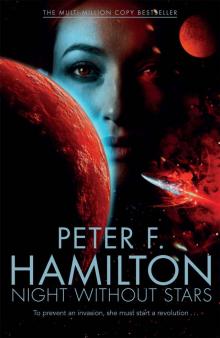 A Night Without Stars
A Night Without Stars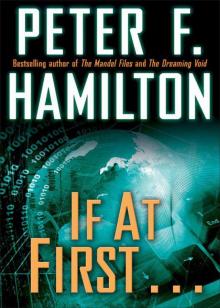 If at First . . .
If at First . . .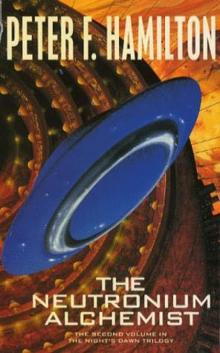 The Neutronium Alchemist
The Neutronium Alchemist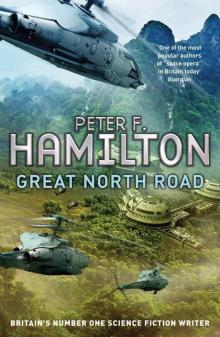 Great North Road
Great North Road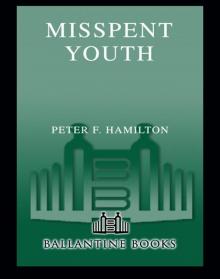 Misspent Youth
Misspent Youth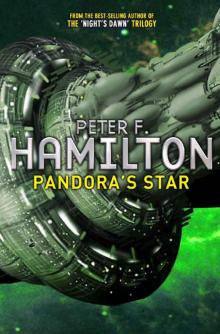 Pandora's Star
Pandora's Star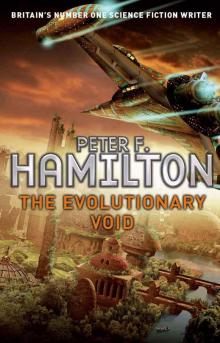 The Evolutionary Void
The Evolutionary Void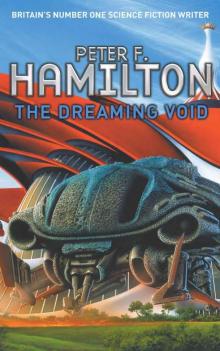 The Dreaming Void
The Dreaming Void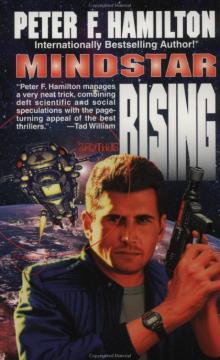 Mindstar Rising
Mindstar Rising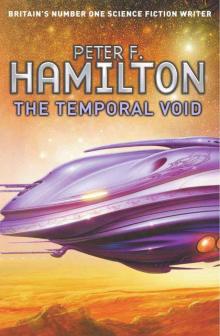 The Temporal Void
The Temporal Void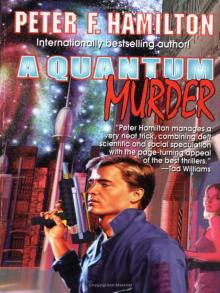 A Quantum Murder
A Quantum Murder The Hunting of the Princes
The Hunting of the Princes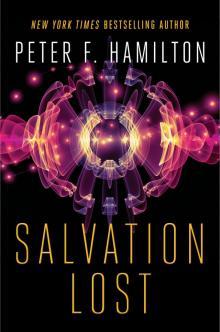 Salvation Lost
Salvation Lost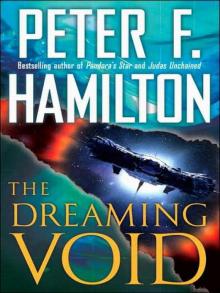 The Dreaming
The Dreaming Salvation
Salvation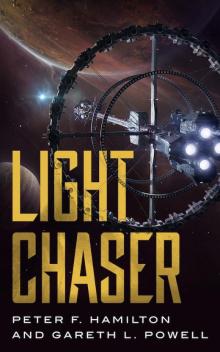 Light Chaser
Light Chaser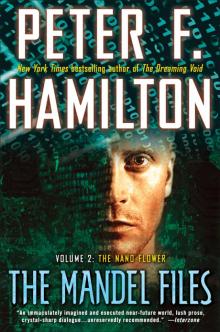 The Mandel Files, Volume 2: The Nano Flower
The Mandel Files, Volume 2: The Nano Flower![The Saints of Salvation [British Ed.] Read online](http://i1.bookreadfree.com/22/the_saints_of_salvation_british_ed__preview.jpg) The Saints of Salvation [British Ed.]
The Saints of Salvation [British Ed.]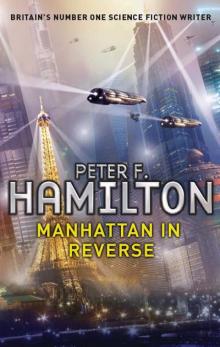 Manhattan in Reverse
Manhattan in Reverse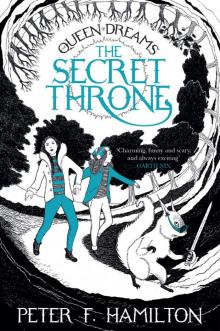 The Secret Throne
The Secret Throne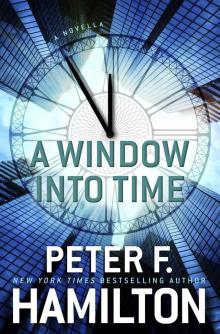 A Window Into Time
A Window Into Time A Second Chance at Eden
A Second Chance at Eden The Nano Flower
The Nano Flower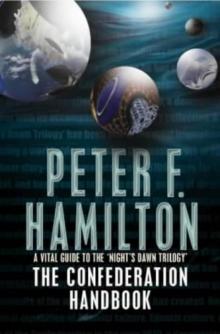 The Confederation Handbook
The Confederation Handbook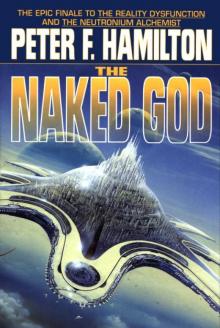 The Naked God
The Naked God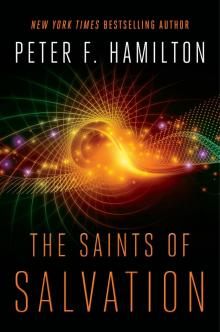 The Saints of Salvation
The Saints of Salvation The Void Trilogy 3-Book Bundle
The Void Trilogy 3-Book Bundle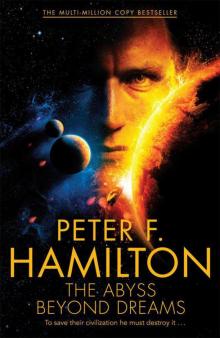 The Abyss Beyond Dreams
The Abyss Beyond Dreams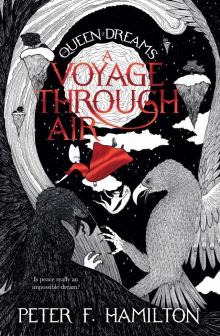 A Voyage Through Air
A Voyage Through Air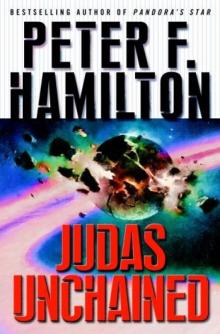 Judas Unchained
Judas Unchained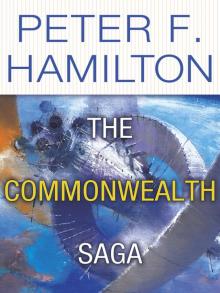 The Commonwealth Saga 2-Book Bundle
The Commonwealth Saga 2-Book Bundle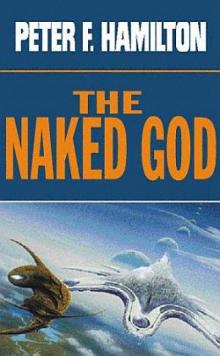 The Naked God - Flight nd-5
The Naked God - Flight nd-5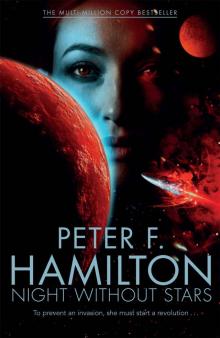 Night Without Stars (Chronicle of the Fallers Book 2)
Night Without Stars (Chronicle of the Fallers Book 2)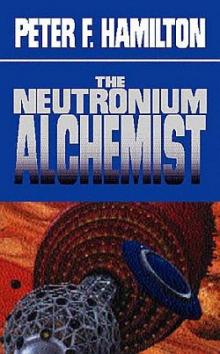 Neutronium Alchemist - Conflict nd-4
Neutronium Alchemist - Conflict nd-4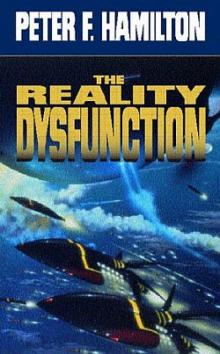 Reality Dysfunction - Expansion nd-2
Reality Dysfunction - Expansion nd-2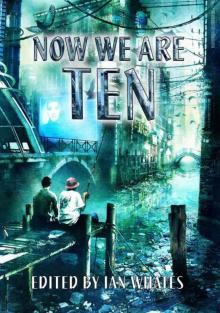 Now We Are Ten: Celebrating the First Ten Years of NewCon Press
Now We Are Ten: Celebrating the First Ten Years of NewCon Press Neutronium Alchemist - Consolidation nd-3
Neutronium Alchemist - Consolidation nd-3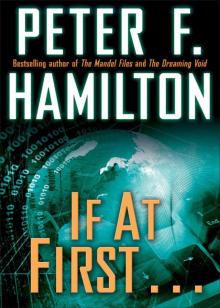 If at First . . . (Short Story)
If at First . . . (Short Story)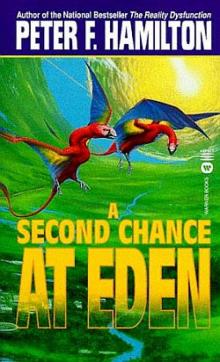 A Second Chance at Eden nd-7
A Second Chance at Eden nd-7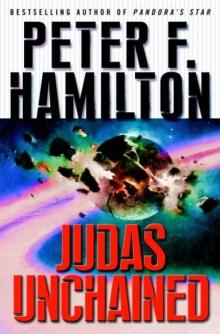 Judas Unchained cs-2
Judas Unchained cs-2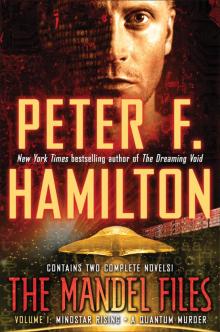 The Mandel Files, Volume 1
The Mandel Files, Volume 1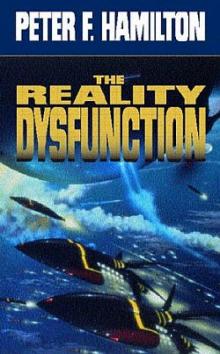 Reality Dysfunction — Emergence nd-1
Reality Dysfunction — Emergence nd-1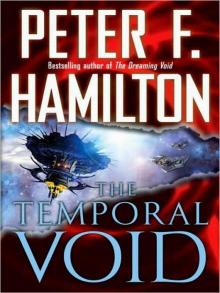 The Temporal Void (ARC)
The Temporal Void (ARC)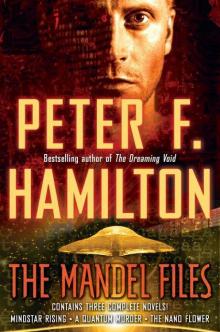 The Mandel Files
The Mandel Files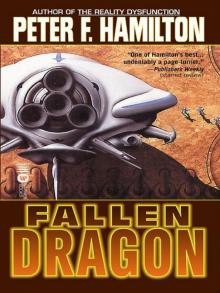 Fallen Fragon
Fallen Fragon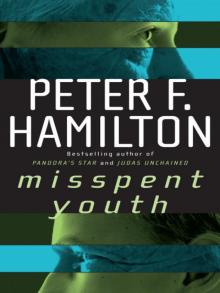 Misspent Youth (commonwealth saga)
Misspent Youth (commonwealth saga)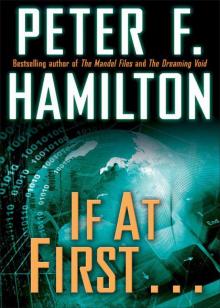 If at First...
If at First...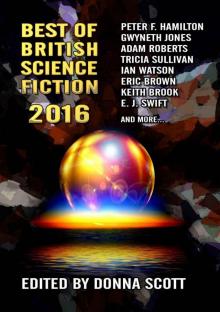 Best of British Science Fiction 2016
Best of British Science Fiction 2016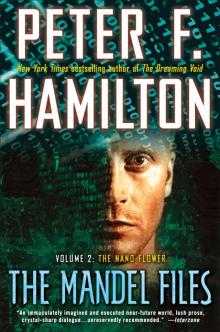 The Mandel Files, Volume 2
The Mandel Files, Volume 2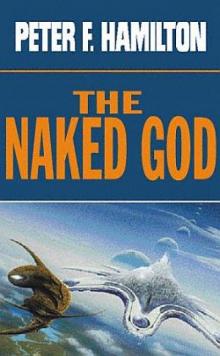 The Naked God - Faith nd-6
The Naked God - Faith nd-6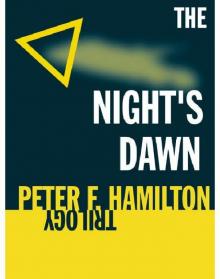 The Night's Dawn Trilogy
The Night's Dawn Trilogy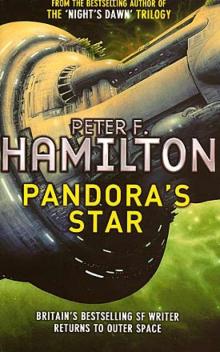 Pandora's Star cs-2
Pandora's Star cs-2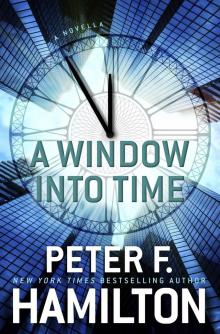 A Window into Time (Novella)
A Window into Time (Novella)